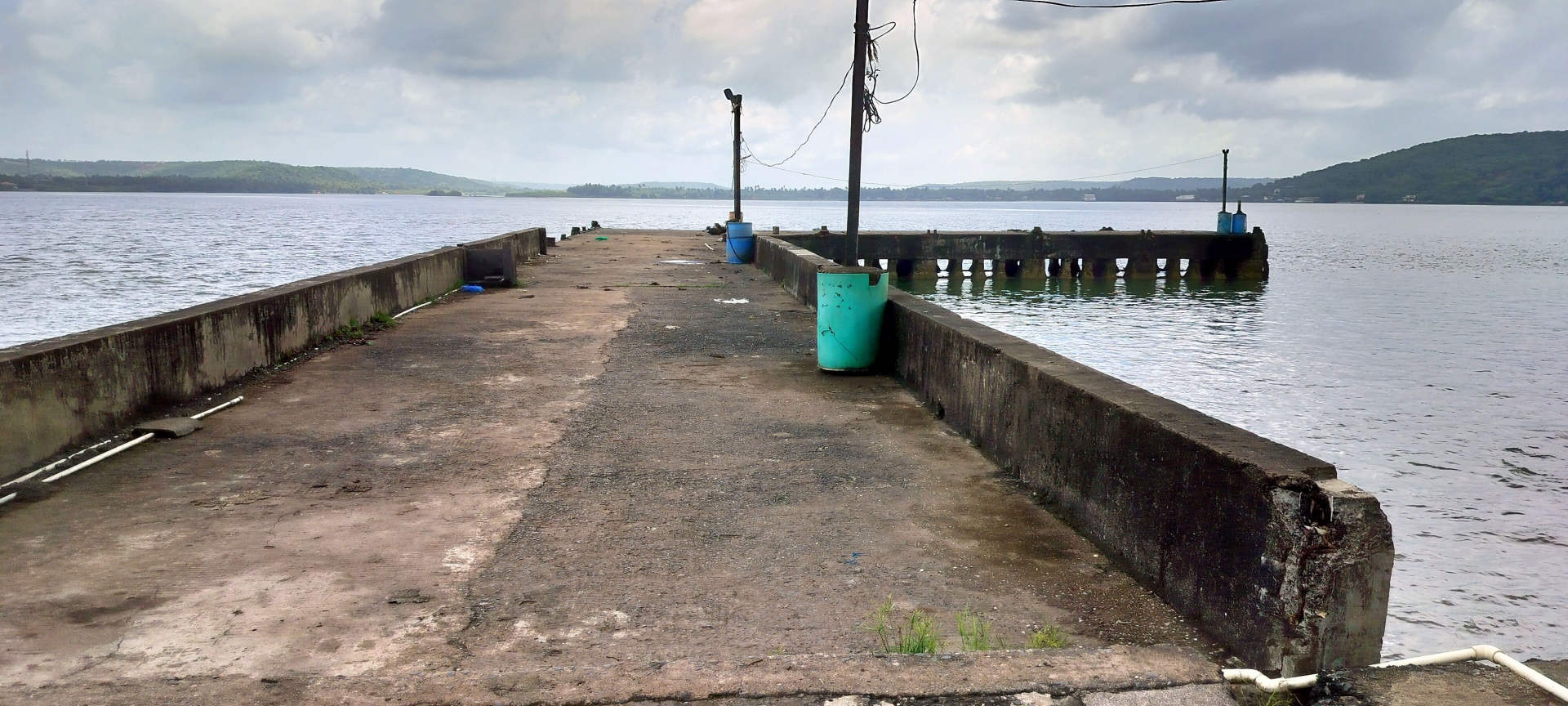
The poor condition of the Chapora Jetty.
MAPUSA
While bustling activity fills jetties across the State, Chapora Jetty remains eerily quiet, its once vibrant fishing industry crippled by neglect and deteriorating infrastructure.
Unlike its peers in Malim and Cutbona, where boats prepare for a busy fishing season, Chapora jetty languishes in disrepair, its future uncertain.
The root cause? Sand bars at the mouth of the Chapora River and a lack of essential government support.
For nearly five months each year, from June to October, the jetty lies dormant, with fishing boats unable to venture out to sea.
The culprit, according to boat owners, is the large sand bars that have formed at the river’s mouth, creating dangerous conditions for vessels.
These sand bars prevent boats from navigating the river freely, often causing them to get stuck or, in more severe cases, leading to accidents that put the lives of crew members at risk.
Boat owners are particularly frustrated with the lack of action on this issue.
The sand bars have made the jetty almost unusable for several months each year, effectively cutting off their livelihood.
"It's dangerous for our boats and crew," said one boat owner who preferred to remain anonymous. "Getting stuck in the sand bar is not only frustrating, but it can also lead to accidents that jeopardise the safety of our workers."
Despite repeated appeals to authorities to dredge the river mouth and clear the passage, boat owners feel their pleas have fallen on deaf ears.
Without action, Chapora jetty will remain underutilised, and the once-thriving local fishing industry will continue to decline.
DECLINE IN NUMBERS
Chapora Jetty, once home to more than 100 boats in the 1990s, now sees just 30-35 boats operating from its deteriorating docks.
The Chapora Boat Owners Cooperative Society, which maintains the jetty, has around 35-40 members who struggle to keep their operations afloat. The reduced number of boats reflects the steady decline in the area’s fishing activity, driven in large part by the jetty's poor condition and the government’s perceived lack of support.
"The condition of the jetty is pathetic. The auction shed’s roof is blown off, there’s no cold storage, and basic facilities like toilets are non-existent. It's a wonder we manage to continue operating here," said one long-time fisherman.
LACK OF AMENITIES
Perhaps the most glaring issue at Chapora Jetty is the absence of basic amenities, leaving boat owners and their crews to work in substandard conditions.
The jetty lacks essential facilities like proper toilets, forcing workers to make do with the most primitive of arrangements. Meanwhile, drinking water is only available because boat owners themselves provide it.
One of the most pressing needs at the jetty is cold storage.
Without it, boat owners are unable to store excess fish, especially during times of bumper catches. Years ago, a cold storage facility was constructed near the jetty, but it now lies in ruins, unused and unmaintained.
GROWING DISCONTENT
Many boat owners feel abandoned by the government, expressing their dissatisfaction with the lack of subsidies and rising taxes.
"The government has failed us completely," said Sunil, a boat owner at Chapora jetty. "They tax us at every turn but don’t provide the subsidies we desperately need. We need support, like VAT exemptions on diesel, dredging of the river mouth, and better facilities like cold storage and hygienic toilets."
Interestingly, even when boats are docked, the crew has no choice but to live on board, often in cramped, unsanitary conditions. The boat owners do not provide them premises to stay.
Chairman of the Chapora Boat Owners Cooperative Society, Balbhim Malvankar, voiced his disappointment with the government’s neglect.
"We have made several appeals to the government to repair the jetty and restore basic facilities, but it’s as if we are shouting into the void," Malvankar said.
According to Malvankar, the cooperative has urged authorities to address two key issues: repairing the entire jetty infrastructure and dredging the mouth of the Chapora River to enable boats to pass through freely.
Without government intervention to repair infrastructure, dredge the river mouth, and provide basic amenities, it remains uncertain whether the once-thriving fishing community will ever recover.
For now, Chapora jetty remains a quiet symbol of neglect, a far cry from the bustling fishing hub it once was.
Until the government addresses their concerns, boat owners continue to wait, hoping that their pleas for help will no longer go unheard.